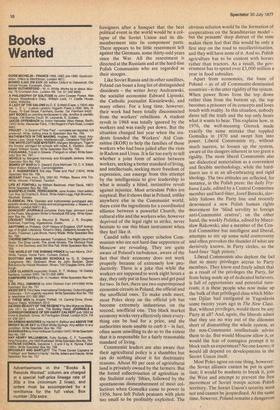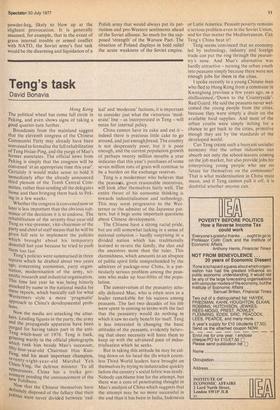Books Wanted
GUIDE MICHELIN-FRANCE 1969, 1963, pre-1960. Good condition. Offers to BM/Eliman, London WC1.
MONRO ILIAD XIII-XXIV 5th edition Oxford to Oakeshott, Old School House, Eynsham, Oxon. MARK RUTHERFORD W. H. White, Works by or about. Murray, 76 Cromwell Ave., London N6. Tel. 01-348 9858. A PHILOSOPHY OF SOLITUDE by John Cowper Powys. Also Parson Woodforde's Diary. William Lock, 11 Castle House, Caine, Wiltshire.
A LADY OF THE SALONS by D. E. Enfield (Cape. c.1924) also her "L E. L." (Leticia Landon) Hogarth Press c,1930. Mrs. N. Pusey, 70 East Street, Farnham, Surrey. Tel. Farnham 5433, ANY BOOKS on painting landscapes in oils, acrylics or pastels. Shape, 138 Marine Court, St. Leonards, E. Sussex, JAKOB OFFENBACH by Anton Henseler (Max Hesse, Berlin, 1930) Write: Alexander Faris, 118d Regent's Park Road, London NW1.
PROUST'In Search of Time Past -complete set required. hib preferred. Write, slating price to Spectator Box No. 765. MATHEMATICS IN THE MAKING. Hogben, 1960. Hood, Airyholme Lane, Great Ayton, Middlesbrough, Cleveland TS9 SHP THE WHITE COTTAGE MYSTERY, Margery AllIngh am. 'Tiger In the Smoke' abridged for schools with notes, E. Haddon, Unabridged 'William' books. Write Spectator Box No. 766. f AUSANIAS, Travel in Greece. (Penguin or other) Write Spectator Box No, 767., NOVELS by Margaret Kennedy and Elizabeth Jenkins. Write, Spectator Box No, 768.
MONKS OF WAR by D. Seward. Eyre Methuen '72. C. K. Elliott, West Walton, Wisbech, Cambridgeshire.
H. F. RUBINSTEIN'S first play 'Peter and Paul' (1924). Write 'Spectator Box No. 769.
MOZART Piano trios. SAL 3681/82. Phillips. Beaux Arts Trio. Write: Skinner, Fitzhead, Taunton.
LIFE AT FONTHILL by William Beckford. (Hart Davie, 1957) Write Spectator Box N. 760.
MANSFIELD PARK, PERSUASION. Jane Austen. Dent edition Col, Illus. by Charles E. Brock. Write Adam Legg, High Brunner„ Mayfiekl, Sussex.
CLASSICAL Ms. Operatic and instrumental purchased also operatic photos, prints, books and old programmes, J. Waters, 41 Midholm, London NW11 6LL.
GONCOURT JOURNALS complete. Early Inge. Johnson Lives of the Poets. Maughann Writer's Notebook RS only. Write Spectator Box No. 761.
CROQUET TODAY by Maurice B. Reckitt, J. R. Douglas, Delamas, Fryerning, Ingatestone, Essex.
ANYTHING on Philately. OUP History of England, OUP Anthology of English Literature, Kilvert's Diary, Detective novels by R. Austin, Freeman, Lyan Brock, Henry Wade. Write Spectator Box No, 762.
THORNE SMITH books wanted. Turnabout; The Night Life of the ' Gods; The Stray Lamb; The Jovial Ghosts; The Glorious Pool; Rain in the Doorway and Did She Fall, Write Spectator Box No. 763. THE WORLD OF THE SHINING PRINCE by Ivan Morris. °III-. Write, Tampa, Home Farm, Culham, Oxford.
SCOTTISH AND ENGLISH SCHOOLS by G. S. Osborne .(Longmans '66), Sickheart River by John Buchan; Good Behaviour by Harold Nicolson. Stiven, 154 Craiglea Drive, Edire burgh.
LOEB CLASSICS especially Greek. E. T. Widdup, 16 Oakley Gardens, London SW3. Tel 01-352 3884.
HAMPSHIRE DAYS by W. H. Hudson, Write Spectator Box No.
'WEIR. FELL OMNIBUS by John Dickson Carr (411959) Write Spectator Box No. 751 WEBSTER'S Third New International Dictionary; Oxford English Dictionary S /H urgently required. Write Spectator Box No. 762 or telephone (01) 582 2691. 0 THESE MEN by Angela Thirkell. 18, Central Drive, Elmer, Bognor Regis. Middleton 3513
'AN IRISH BEAUTY OF THE REGENCY by Mrs Warenne Blake. pub 1911 by John Lane, The Bodley Head. JOURNALS & CORRESPONDENCE OF SIR HARRY CALVERT pub 1863 by Hurst & Blacken, Grove, 30 Farringdon Street, London EC4. Tel 01-236 3011 "A-N AIRMAN MARCHES by Harold H. Balfour and ABOVE THE BRIGHT BLUE SKY by Elliott White Springs. Any edition in any condition, Write Spectator Box No, 753
BABABUKRA by Imre Hofbauer (London 1947). Write Spectator Box No. 754 "ANY HENRY WILLIAMSON, Folio Society. C. F. Tunnicliffe, King Penguins, pre 1900 illustrated. Write Spectator Box No. 755 VATICAN COUNCIL Sessions 1, 3 and 4 by X. Rynne. Faber 1960s. Write Spectator Box No. 756 BROADLEY AND BARTLETT 'The Three Dorset Captains at Trafalgar' and 'Nelsen's Hardy'; his life, letters and friends. Write Spectator Box No, 757
foreigners after a banquet that the best political event in the world would be a collapse of the Soviet Union and its dismemberment into its component parts. There appears to be little resentment left against the Germans, some thirty-odd years since the War. All the resentment is directed at the Russians and at the hard-line. Polish Communists who are regarded as their stooges.
Like Soviet Russia and its other satellites, Poland can boast a long list of distinguished dissidents — the writer Jerzy Andrzewski, the socialist economist Edward Lipinski, the Catholic journalist Kiesielewski, and many others. For a long time, however, their work had been totally disconnected from the workers' rebellions. A student revolt in 1968 was totally ignored by the workers and was easily put down. But the situation changed last year when the students founded the Workers' Aid Committee (KOR) to help the families of those workers who had been jailed after the riots in Radom and Ursus. It is far too early to tell whether a joint form of action between workers, seeking a better standard of living, and intellectuals, seeking more freedom of expression, can emerge from this attempt by the intelligentsia to give leadership to what is usually a blind, instinctive revolt against injustice. Most articulate Poles are sceptical. But it shows that in Poland, unlike anywhere else in the Communist world, there exist the ingredients for a coordinated alliance between a powerful Church, the cultural elite and the workers who, however deprived of the legal right to strike, never hesitate to use this blunt instrument when they feel like it.
Candid talks with upper echelon Communists who are not hard-line supporters of Moscow are revealing. They are quite aware of Poland's turbulence, aware of the fact that their economy does not work properly because of extremely low productivity. There is a joke that while the workers are supposed to work eight hours a day, they only put in four hours and get paid for two. In fact, there are two superimposed economic circuits in Poland, the official and the unofficial ones. To make ends meet, most Poles sleep on the official job but become extremely industrious on the second, unofficial one. This black market economy works very effectively since everything can be had for a price, and the authorities seem unable to curb it — in fact, often seem unwilling to do so to the extent that it is responsible for a fairly reasonable standard of living.
Communist leaders are also aware that their agricultural policy is a shambles, but can do nothing about it for doctrinaire reasons. About 80 per cent of agricultural land is privately owned by the farmers. But the forced collectivisation of agriculture in the Stalinist early 'fifties, followed by the spontaneous dismemberment Of most collectives when Gomulk a came to power in 1956, have left Polish peasants with plots too small to be profitably exploited. The
obvious solution would be the formation of cooperatives on the Scandinavian model — but the peasants' deep distrust of the state makes them feel that this would be only a first step on the road to recollectivisation, and they will have none of it. And so, Polish agriculture has to be content with horses rather than tractors. As a result, the government has to spend over £3,000 million a year in food subsidies.
Apart from economics, the bane of Poland — as of all Communist-dominated countries — is the utter rigidity of the system. When power flows from the top down rather than from the bottom up, the top becomes a prisoner of its concepts and loses touch with reality. In this situation, nobody dares tel the truth and the top only hears what it wants to hear. This explains how, in 1976, the well-meaning Giereck made exactly the same mistake that toppled Gomulk a in 1970 and swept him into power. Liberal Communists try, without much success, to loosen up the system, aware of the dangers inherent in too great a rigidity. The more liberal Communists also see dialectical materialism as a convenient and flexible methodology, while the hardliners see it as an all-embracing and rigid ideology. The two attitudes are reflected, for instance, in the Polish press: the daily Trybuna Ludu, edited by a Central Committee member and hard-liner, Jozef Barecki, slavishly follows the Party line and recently denounced a new Polish human rights movement for 'blind servility to foreign anti-Communist centres'; on the other hand, the weekly Politika, edited by Mieczslaw Rakowski, also a member of the Central Committee but intelligent and liberal, attempts to stir up some mild controversy and often provokes the thunder of what are derisively known, in Party circles, as the hard-liner 'high priests.'
Liberal Communists also deplore the fact that so many privileges accrue to Party members. They know and freely admit that as a result of the privileges the Party, far from being made up of dedicated believers, is full of opportunists and potential turncoats; it is these people who now make up the bulk of that privileged class which Milovan Djilas had castigated in Yugoslavia some twenty years ago in The New Class. But, without privileges, would there be any Party at all? And, again, the liberals admit that they see no way out of the dilemma short of dismantling the whole system, as the non-Communist intellectuals advise them to do. But would Moscow allow it, or would the fear of contagion prompt it to block such an experiment? No one knows; it would all depend on developments in the Soviet Union itself.
Most Poles agree on one thing, however: the Soviet alliance cannot be put in question; it would be madness to break it, join the West and attempt to prevent the free movement of Soviet troops across Polish territory. The Soviet Union's security must not and cannot be jeopardised. At the same time, however, Poland remains a dangerous
powder-keg, likely to blow up at the slightest provocation. It is generally assumed, for example, that in the event of grave internal trouble or armed conflict with NATO, the Soviet army's first task would be the disarming and liquidation of a Polish army that would always put its patriotism and pro-Western sentiments ahead of the Soviet alliance. So much for the supposed `strength' of the Warsaw Pact. The situation of Poland, displays in bold relief the acute weakness of the Soviet empire.



































 Previous page
Previous page